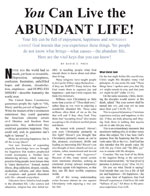 Getty Images
Getty Images
Article
While stress is inseparable from daily life, how you deal with it can determine success or failure.
Learn the why behind the headlines.
Subscribe to the Real Truth for FREE news and analysis.
Subscribe NowHow many times have you had a coworker approach you, wearing an exasperated expression, eyelids heavy with fatigue, and say, “I am stressed out!”
Have similar expressions ever left your lips? Have you ever felt overwhelmed by all you need to accomplish in a given day, week or month?
You are far from alone. We live in an age when stress can be very intense. Life in the 21st century, while boasting conveniences and comforts unknown to previous eras, also has new and different pressures. And some are finding themselves pushed to the edge.
Causes and Effects
The most commonly reported causes of stress are the areas of life that one would expect to be cited: job and workplace requirements, financial difficulties, personal relationships, the emotional and time investments of childrearing, and simply being too busy.
The modern, hurry-up age presents a paradox: technology allows us to be more informed and connected to each other than ever before, which can greatly increase efficiency and productivity. But this can reach a point of diminishing returns. The nonstop barrage of information flowing from all directions is another form of stress that is unique to the age in which we live. Emails, text messages, television, radio, phone calls (landline and mobile), post mail, ever-expanding advertising venues—all of these sources of input equate to many interruptions and distractions throughout the day, competing for our attention and draining our time. (Some corporate executives and senior managers report they receive hundreds of emails each hour!)
A person’s living environment also plays a role. Those who live in crowded metropolitan areas, battling traffic jams, spending many hours in a long commute each week, and living at a fast pace, are among the most likely candidates for being stressed out.
Many people are overscheduled and overcommitted, spending hours each week on unprofitable pursuits. In some cases, the activities are worthwhile and valuable, but there are simply too many—all simultaneously demanding a person’s attention and energy.
Chronic stress has considerable effects on the mind and body: headaches, sleep disturbances, cardiovascular disease, digestive problems, a depressed immune system, reproductive disorders and many other maladies are all linked to it.
Part of Life
Though we might wish otherwise, stress is inseparable from everyday life. And a degree of stress is necessary—without it, progress and growth could not occur.
Some research supports the notion that stress is actually good for our health—in reasonable amounts, as reported by MSNBC: “Moderate amounts of stress—the kind of short-term buzz we get from a sudden burst of hormones—can help people perform tasks more efficiently and can improve memory. Good stress is the type of emotional challenge where a person feels in control and provides some sense of accomplishment. It can improve heart function and make the body resistant to infection, experts say. Far from being something we need to eliminate from our lives, good stress stimulates us.
“‘Think about your daily life—when do you get things done?’ asks Janet DiPietro, a developmental psychologist at the Johns Hopkins Bloomberg School of Public Health in Baltimore. ‘When you have a deadline, when you have to perform. You want some stress to help you do your best.’”
The effects of stress can be greatly affected by our mental approach. Viewing stress as a challenge to be met and overcome, rather than an unexpected crisis or unfair burden, can have positive effects on our outlook and health. Accepting it as part of life, rather than complaining, will in itself reduce stress—and conserve time and energy in the process.
Changing your outlook is vital, and looking for positives that you may take for granted can go a long way toward this goal. Is your job stressful? Be thankful that you are employed, especially in a shaky global economy. Do your children sometimes give you headaches? Remember how much you would miss them if they were gone!
There are a number of other ways to manage and minimize stress. Regular moderate exercise, a balanced, healthy diet, and taking some time for relaxation and recreation are key.
Recognize that poor time management can unnecessarily magnify stress. Undisciplined television viewing or Internet surfing can vacuum up many hours each week, forcing important tasks to be crammed into unrealistic timeframes. And a cluttered, disorganized office or home can also slow down the completion of tasks, and thereby increase deadline pressure.
Beware! Stress can be turned into “a handy ready-made excuse for all sorts of bad behaviors, from being grumpy to making a mistake,” a separate MSNBC article reported. “You are so frazzled you only got four hours of sleep, after all. Wearing stress as a badge of honor can also serve as [a] defense mechanism. When you show the world you are totally stressed out you’re sending out a signal: Don’t give me any more stuff to do.”
The ultimate goal is to manage stress and avoid becoming overstressed.
Instruction Manual
Why must stress and difficulty be a part of human existence? While many will not even entertain the idea of human life having been created by a Supreme Being, those who are willing and able to prove the existence of a Creator God can be led to truths that are life-changing.
We were created to live a certain way, and the Creator provided an Instruction Manual most will not take seriously. The Bible describes—for the willing student—the path to an abundant and happy life. It provides principles designed to guide man, including ways to properly handle stress.
Life involves stress—this is how God designed it. After the first human beings made foolish choices, He told them, “Cursed is the ground for your sake; in sorrow shall you eat of it all the days of your life; thorns also and thistles shall it bring forth to you; and you shall eat the herb of the field; in the sweat of your face shall you eat bread, till you return unto the ground; for out of it were you taken: for dust you are, and unto dust shall you return” (Gen. 3:17-19).
History has shown that prosperous societies with relatively little stress and an overabundance of leisure time inevitably become decadent, and collapse. Some hardship is necessary to counteract the excesses of human nature.
Though the word “stress” is not found in the Bible, a similar term—“adversity”—is mentioned a number of times. Again, it is part of God’s design: “In the day of prosperity be joyful, but in the day of adversity consider: God also has set the one over against the other” (Ecc. 7:14).
God also throws down a challenge: “If you faint in the day of adversity, your strength is small” (Prov. 24:10). It is His intent that we are strengthened by stress; for this to occur, we must continue battling, and never give up!
Weekly Stress Relief
Scripture also contains a law that will automatically reduce stress, one of the Ten Commandments: “Remember the Sabbath day, to keep it holy. Six days shall you labor, and do all your work: but the seventh day is the Sabbath of the Lord your God: in it you shall not do any work, you, nor your son, nor your daughter, your manservant, nor your maidservant, nor your cattle, nor your stranger that is within your gates: for in six days the Lord made heaven and earth, the sea, and all that in them is, and rested the seventh day: wherefore the Lord blessed the Sabbath day, and hallowed it” (Ex. 20:8-11).
This weekly day of rest, set apart by God, is a chance to be rejuvenated physically, spiritually and in all other ways. Far from being a “Jewish tradition,” as many assume, the Fourth Commandment is a law that is in force today. The apostle Paul, decades after the New Covenant came into effect with Jesus Christ’s death, wrote, “There remains therefore a rest [Greek: sabbatismos, “a keeping of the Sabbath”] to the people of God” (Heb. 4:9).
Taking a broader view, living in harmony with all of the elements in the Instruction Manual called the Bible leads to lower stress in many areas of life. While this does not mean a complete absence of pressure or stress, the God of the Bible states, “Beloved, I wish above all things that you may prosper and be in health” (III John 2).
Does this sound like the kind of life you would like to have? To learn more, watch The World to Come broadcast How to Live the Abundant Life!



